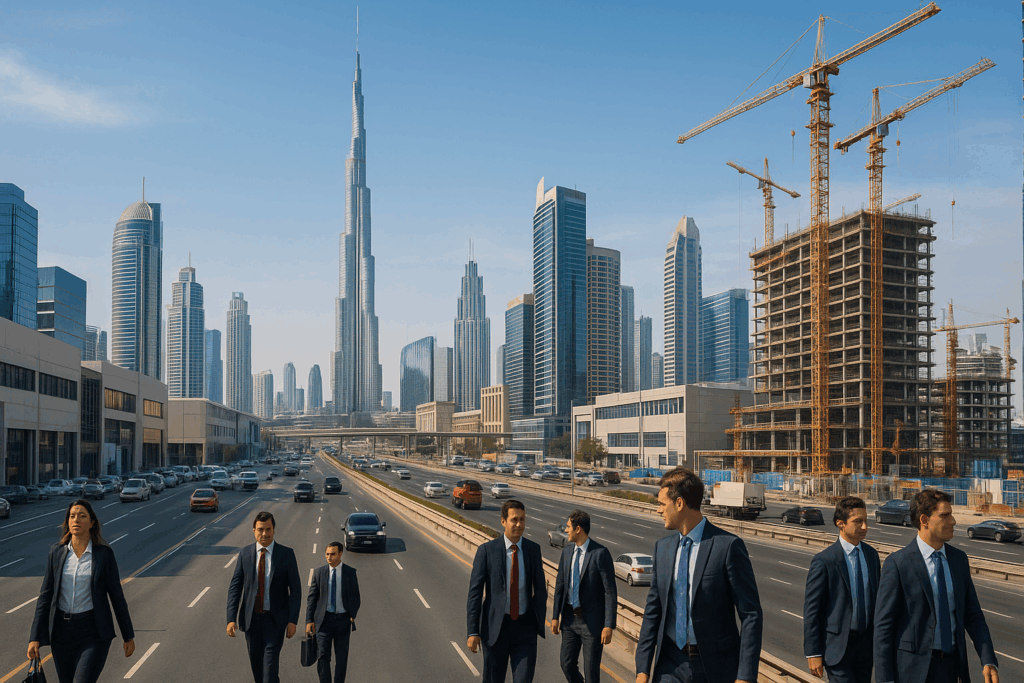Table of Contents
Introduction: Navigating Dubai’s Commercial Real Estate Landscape
Dubai offers compelling opportunities for investors in commercial real estate. While residential attracts attention, specialized commercial sectors promise high returns. For landlords, understanding commercial property development here is key. Dubai has built world-class infrastructure, a feat often requiring collaboration with a construction company in Dubai known for tackling ambitious projects. This guide covers identifying sectors, development, and yield strategies.
Why Invest in Dubai’s Commercial Properties?
Dubai’s economic strategy fosters a strong commercial real estate market. Its role as a global hub drives demand across various property types. For exceptional development, identifying the Best construction company in Dubai is a first step toward ensuring quality and high standards.
Dubai’s Resilient Economy and Growth Drivers
Dubai’s economy is robust and diversified, fueled by trade, logistics, tourism, and finance. Pro-business policies create a stable environment for commercial ventures, boosting demand for space.
Strategic Location as a Global Hub
Dubai’s location connects East and West, facilitating trade via world-class ports, airports, and roads. This makes it ideal for businesses needing global access, increasing demand for well-placed properties. For major infrastructure projects and defining developments, collaborating with a Top construction company in Dubai is typically essential.
Investor-Friendly Environment and Incentives
Dubai offers investor incentives like favorable tax regulations and streamlined business setup. Free zones provide further benefits, making the emirate appealing for commercial real estate investors.
Identifying High-Yield Commercial Property Opportunities
Finding high-yield commercial properties requires understanding market dynamics and sector demands.
Understanding Market Demand and Trends
Tracking market data, occupancy, and rental growth across commercial sectors identifies high-yield potential. Factors like e-commerce and evolving work patterns influence demand.
Pinpointing Prime Industrial and Business Zones
Dedicated zones like JAFZA, Dubai South, DIP, and Dubai Industrial City are crucial for logistics, manufacturing, and trade properties, offering specialized infrastructure.
Exploring Different Commercial Property Types
Understanding commercial segments is key. Each type presents unique development considerations.
Warehousing and Logistics Facilities
E-commerce and Dubai’s hub status create high demand for modern warehouses. These need specific features like high clear heights and ample bays. Developing these requires significant building contracting expertise to meet supply chain demands.
Modern Office Spaces
Demand exists for Grade A offices in prime districts with modern tech and flexible layouts catering to new workstyles.
High-Footfall Retail Units
Strategically located retail in high-traffic areas offers good yields, serving residents and tourists.
Specialized and Niche Properties
Opportunities lie in niche properties like healthcare, education, and F&B in key locations, requiring specialized development.
The Development Journey: From Concept to Completion
Developing commercial property requires careful planning and execution.
Market Research and Feasibility Studies
Thorough research and a feasibility study validate the investment, assess returns, and refine the project concept.
Legal and Regulatory Frameworks
Navigating Dubai’s regulations, including zoning and permits, is critical for compliance throughout the project.
Site Acquisition and Planning
Choosing the right location and detailed planning for layout and functionality are essential after site acquisition.
Design Considerations for Modern Commercial Use
Designs must be functional, sustainable, and adaptable, integrating space efficiency and technology. Translating design into reality requires a skilled building contracting company dubai capable of precision.
Securing Construction Permits and Approvals
Obtaining permits from Dubai authorities is a crucial administrative step requiring meticulous documentation.
The Construction Phase
This phase brings blueprints to life through planning, execution, and coordination. Quality control, material procurement, and safety are paramount.
Strategies for Maximizing Rental Yields
Maximizing yields involves attracting tenants and managing properties effectively.
Competitive Pricing and Lease Structures
Setting competitive rents and offering attractive lease terms secures tenants quickly.
Effective Property Management
Efficient management maintains asset value and ensures tenant satisfaction through maintenance and communication.
Investing in Quality and Amenities
High-quality construction and amenities make properties appealing, allowing higher rents and better occupancy.
Building Long-Term Tenant Relationships
Positive tenant relationships lead to lease renewals and stable income.
Partnering with the Right Professionals
Success in commercial property development is enhanced by experienced professionals.
The Role of Real Estate Consultants
Consultants specializing in commercial real estate provide market insights and assist transactions.
Legal and Financial Guidance
Legal and financial advisors ensure compliance and manage project finances.
Choosing an Experienced Construction Partner
For maximum yield and minimal risk, partnering with the right builder is essential. An experienced partner ensures the development is high-quality, on time, and within budget, impacting profitability and value.
Conclusion: Building a Profitable Commercial Property Portfolio in Dubai
Investing in high-yield commercial properties in Dubai is promising. By understanding the market, identifying opportunities in sectors like logistics, managing development, and using yield strategies, investors build profitable portfolios. Dubai’s commercial real estate offers significant rewards for those with knowledge and strong partnerships.

